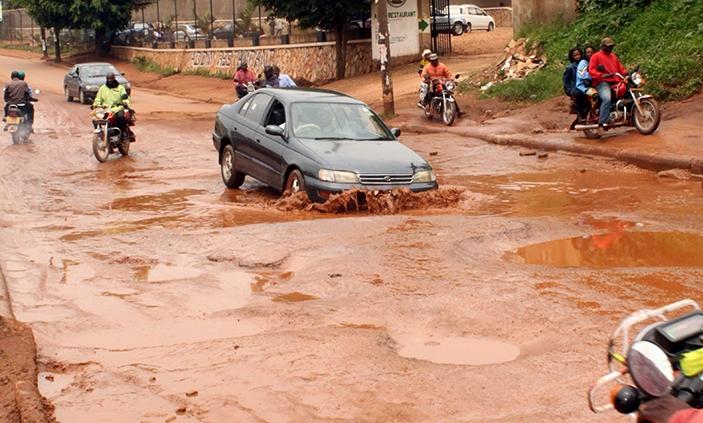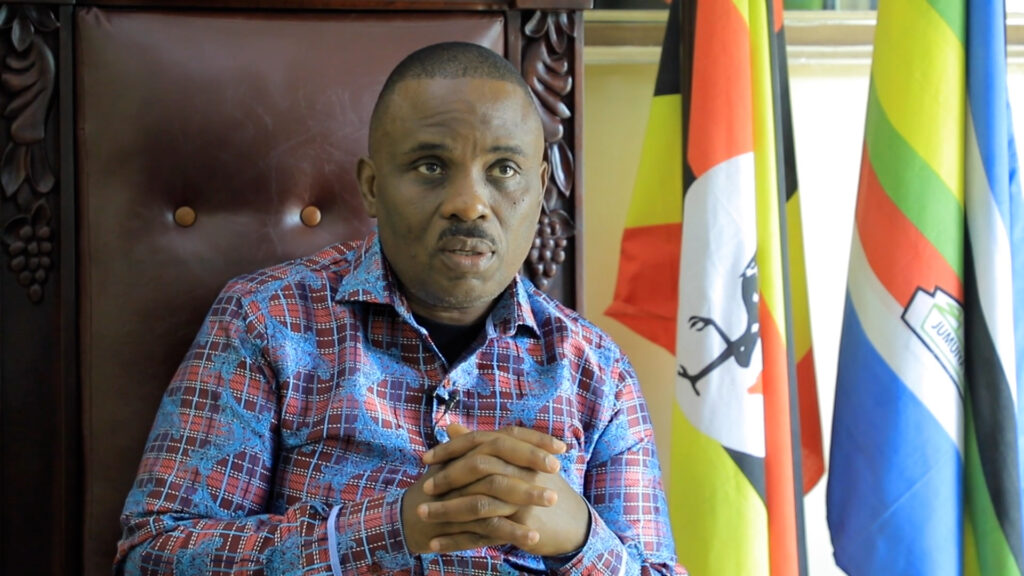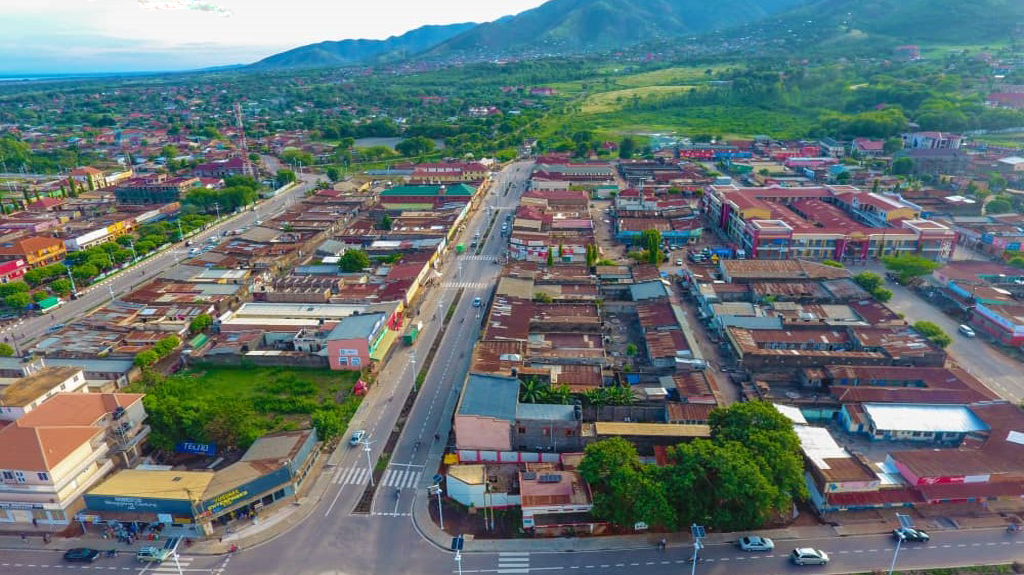By Jerome Kule Bitswande
The over aching noise, a scintillating overdrive of a disorganized herd of bodabodas circumventing the city’s potholes creates nothing but an impression of an ill-planned, risky and dangerous town to navigate.
In November 2023, The Irish Ambassador to Uganda, Mr Kevin Colgan, sarcastically advised tourists intending to visit Uganda’s breath-taking sceneries to view what he called Uganda’s “crater potholes” in Kampala industrial area adding that they would equally find enjoyable wild herds of reckless boda-bodas riders.
But while Mr Colgan made these comments with some little bit of humour, the poor quality of infrastructure and especially the road network put not only the livelihoods of the residents at stake but also endangers the lives of so many city dwellers.
Mr Amon Bahamwithi, was a boda-boda rider in Kampala until 2017 when in an attempt to dodge a pothole along Kamwokya, he suffered an overhead collision with a vehicle in an accident that not only shattered his motorcycle but also caused him permanent disability.
Following his accident, Bahamwithi was amputated, his right limb was removed and he can no longer walk without an aid in clutches.
“Those potholes in Kampala are death traps. I am lucky I did not meet my creator that night. However, it has caused irreparable damage as you can see, I will never walk again. My prayer is that another rider doesn’t suffer a fate similar to mine just because of something as simple as potholes in the city.” Bahamwithi told this writer.
But since 2017 to today, the state of road infrastructure in Kampala Metropolitan has instead deteriorated prompting even a section of young people and renowned academic in Assoc Prof Jimmy Spire Ssentongo to run an online criticism of Kampala’s Road network dubbed “pothole exhibition” to exhibit the poor quality of the roads in Kampala, Wakiso and Mukono.
And yet we are not talking about anything different; it is Kampala, which is not only the capital city but also the business hub of Uganda. It also should ideally be the face of the entire country.
According to the preliminary results of the 2024 National Population Census by Uganda Bureau of Statistics, Kampala and its metropolitan districts boasts of a population of 6.2 million people many of them going about the hustle and bustle in the busy potholed and dusty streets.
The poor road network including the several “larger crater potholes” and poor drainage systems not only in Kampala but also across the metropolitan towns of Mukono and Wakiso have left a lot of questions begging. Why is the Kampala Metropolitan Area plagued with a fractured and disjointed road infrastructure despite its population explosion and a strong business potential? Does their voting patterns inform the level of government investment in infrastructure of that particular? Or rather still, are people denied any services on the basis of how they vote or their political affiliation?

Vehicle navigates a flooded city radio (Courtesy picture)
Peter Mulindwa, a resident of Bulindo in Kiira Municipality in Wakiso District says government must be denying the people of Kampala services because they have largely been voting for opposition political candidates during the general election.
“I think we are being punished for the political choices we made otherwise what reasonably explains why the capital city and other surrounding towns are in tatters. Looks the idea that people can elect leaders of their choice is a bluff in this our country.” Mulindwa said.
Kira Municipality is under the leadership of Mr Julius Mutebi Nsubuga who subscribes to the opposition National Unity Platform. The area is also represented in Parliament by Mr Ibrahim Semujju Nganda, a vocal legislator of the Forum for Democratic Change-FDC who is serving his third term.
Ssemujju succeeded the now late Sam Kalega Njuba who represented Kyadondo East under which Kiira Municipality lied. Njuba was a founding member of the opposition FDC Party who also served as its chairman.
Mr Nsubuga, the Mayor of Kiira Municipality says the area has a total of 298 kilometres yet only a paltry 65 kilometres have been tarmacked explaining that 30 of these have also worn out and are constantly patched for them to be a little motorable.
“We are really short on funding because we get only 1 bn shillings in infrastructure development and an additional 1.5 billion shillings in transitional grant to do the same. Parliament recently increased our budget by an extra 1 billion shillings totalling to 3.5 billion annually. However, this money is still nothing compared to the number of kilometres we are supposed to work on.” Mr Mutebi said.
Mr Mutebi opines that the that the government allocates a small amount of money to the municipality well aware that it cannot do enough to improve the road network explaining that it has a lot to do with government having alternative priorities.
“I may not necessarily say that it is politics but I really want to believe that government has not prioritized road infrastructure in Kampala and the surrounding towns. I think there is need to allocate more money to the urban areas. Because with what we are now getting, it would require us about 100 years for us to tarmac all the 298 kilometres yet every single day there is a new road that is opened within the municipality.”
During one of his visits in Kampala, President Yoweri Museveni was confronted by one of the residents about the poor state of the roads within the city.
In what looked like a bizzare response, Mr Museveni accused the people of Kampala, Wakiso and Mukono of voting “wrongly” when they voted for the opposition leaders.
Kampala’s Political Representation
However, it is not just Kira Municipality under the opposition political parties. The entire Wakiso, Kampala and Mukono districts are headed by opposition politicians and also represented in parliament by opposition legislators most of whom are members of the National Unity Platform-
But Kampala Lord Mayor Erias Lukwago argues that the capital city and the metropolitan areas grappling with a poor road network as a punishment to the voters for exercising their political leaders to elect leaders of their choice.
According to Lukwago, there have been deliberate efforts by government to frustrate the elected leaders of Metropolitan Kampala from delivering on their manifestos through underfunding the local governments especially in terms of road infrastructure.
“Recently Gen Museveni revealed the politics behind the poor road infrastructure in Kampala. He did say that Kampala roads are luxury roads and that as a strategy of government they started with up-country roads which he claimed to be commercially productive. Of course, this borders on sinister motives as he [President Museveni] considers Kampala a rebellious territory since it has always returned opposition leaders for most elective positions. That is the reason there has been perpetual neglect of the infrastructure in Kampala.” Mr Lukwago said.

Kampala Lord Mayor Erias Lukwago during an interview with this writer at City Hall. (Photo by Kim AIIJ)
According to Lukwago, the city’s road network has been deliberately underfunded so as to punish Kampala voters for voting the likes of Lukwago. Kampala city a lone has a total of 2110 kilometres of road and only 700 of these are paved leaving the remaining kilometres of road in a dire state.
“The statutory funding from central government is pea nuts and it can not even do one kilometre of road network. This situation leaves us with nothing but to do patches on the existing road network. The state of our road infrastructure is dire and unless deliberate efforts are put in place to address the challenge. Otherwise, what we are receiving right now is just a drop in the ocean.” Mr Lukwago added.
The 26th Annual Report on the state of Human Rights and Freedoms in Uganda by the Uganda Human Rights Commission indicates that rural areas have better roads than Kampala city and the metropolitan area.
“The Commission established that in the districts monitored, Government had made positive strides towards improvement of the road network and bridges across the country which in turn enhanced access to other services. Most urban roads were tarmacked which increased urban rural connectivity. These include Kampala Jinja Highway, Fortportal to Bundibugyo, Kampala-Entebbe Expressway, Soroti Moroto and, Kampala Gulu highway among others. However, while there is improvement in the road infrastructure, most of the roads especially in the urban areas were in poor condition. This was so especially in the Kampala metropolitan, Wakiso and Mukono areas where some roads were almost impassable during rainy seasons.” Reads part of the report.
The Human Rights body also noted that a number of roads in Mukono, Wakiso and Kampala Districts (Kampala metropolitan area) are majorly narrow, dusty, and with pot-holes, due to lack of road maintenance.
“In this case, the UHRC found a stark contrast between transport infrastructure in the countryside and that in the Kampala metropolitan area. While rural areas boast of good-quality infrastructure, Kampala, Mukono and Wakiso face significant challenges. It was also noted that the roads have served far beyond their lifespan of 20 years, with the increasing number of vehicles further worsening the wear and tear of the roads” The report added.
So, with the revelations by Uganda Human Rights Commission, we visit Kasese to visit another opposition to assess the level of infrastructure and ascertain whether like Kampala, the area could be struggling with poor infrastructure.
A tour into the Kasese, the country’s opposition stronghold and the state of infrastructure development.
Located in the Rwenzori sub-region in Western Uganda, Kasese has been home to the opposition. The borderland district remains an island of the Forum for Democratic Change-FDC with three of her six legislators subscribing to the opposition party.
Kasese’s main town, Kasese Municipality is headed by Mr Chance Kahindo, a strong member of the opposition FDC party. However, the town presents one of the best infrastructure views especially in the central business district.
Beautifully made streets with a solar-powered lighting system, permanently installed dustbins and an improved drainage system has booked Kasese town a place as one of the most beautiful towns not only in Western Uganda but also across the entire country thanks to the World Bank-funded Uganda Support to Municipal Infrastructure Development-USMID.

At least from the picturesque that the town treats your eyes to; it would be unfathomable that government has denied any service to the people of Kasese or to Kasese town on the basis of their political affiliation.
Former Kasese district chairperson, Mr Geoffrey Sibendire Bigogo who was at the helm of the opposition district between 2016 and 2021 says there is no deliberate government policy that discriminates opposition inclined districts from any governments.
“The main stream public service works with leaders and not politicians. I can assure you that whatever office I ever went to, I would be received as the district chairman and not as a member of the FDC. So, fundamentally, a district loses nothing voting for an opposition candidate.” Bigogo explained.
However, Bigogo says whereas President Museveni’s comment on “a people voting wrongly” can best be described as a rhetoric when it comes to main stream public service, he says the president has seemingly applied it when it comes to resources allocated to his office.
According to Mr Bigogo, only children of NRM fanatics normally benefit from statehouse scholarships and a few other special interest groups yet there ought to be a formula that allows all citizens to benefit on such schemes based on meritocracy.
He adds that the opposition-inclined districts also suffer a great deal when it comes to appointment into positions of responsibility which eventually affects the lobbying capacity of that particular community.
“It is very true that when it comes to presidential appointments, Kasese is normally not well considered. I think that is where the president sidelines people who vote the opposition.” Bigogo opined.
In 2016, after Kasese voted opposition largely the opposition in the district council with the FDC also scooping all the six parliamentary seats in the district, the most populous district in the country after metropolitan Kampala never received a cabinet appointment.
The former district chairperson adds that because of the president’s continued rhetoric and systemic discrimination against supporters of the opposition has increased overzealousness among some state functionaries especially GISOs and other low rank NRM officials.
“Like I have told you before the district may not wholly be sidelined for supporting the opposition, however we have some overzealous GISOs who deny opposition supporters access to government resources including a number of government programmes. This is common knowledge” He added.
Bigogo also opines that an area especially if it does not get appointments in influential positions, it lowers its bargaining power when advocating for certain services from government.
But Is it True that Some Opposition People are Denied Opportunities?
Bryans Basiisa is the Coordinator of the National Unity Platform in Kasese; he also owns and operates MBM Sounds, a public address system within Kasese town.
According to Basiisa, he was for a good period of time one of the service providers to Kasese District Local Government who would provide a public address system when the district would conduct big sessions.
He, however, says when the new leadership of the district came in [during 2021 election] shortly after he had also declared joining opposition National Unity Platform-NUP, he has never received an opportunity to provide a service to the district again.
“During the FDC regime in Kasese, my political affiliation was never an issue although I belong to NUP, however, once the NRM took charge of the district, I was sidelined. Now, it is only one of the strong NRM members who is offering this service. I was told that they can’t continue empowering a member of NUP by giving him business.” Basiisa said.
Basiisa argues that it is unfortunate that persons who occupy public offices use them to stifle divergent opinions instead of using them to benefit all Ugandans.
Mr Joefrey Bwambale (Not real name) says his wife has twice been denied jobs on the basis that her husband is a strong a FDC supporter.
“There is a time my wife wanted to join the Uganda Police Force, however, the GISO declined to give her a recommendation on grounds that she is married to me. Later, when she wanted to join public service as a parish chief; we were advised to get a recommendation from the office of the village NRM chairperson showing that she is a member of the NRM despite her husband’s affiliation to the opposition party. This has almost caused me domestic violence in my family.” He revealed.
Mr Bwambale showed this writer a copy of the letter that village chairperson wrote to the RDC to prove that his wife subscribes to the NRM. “This extent of discrimination makes you wonder if you have to be NRM to benefit from the government and its programmes. I think this is one of the biggest forms of impunity.” Mr Bwambale added.
Mr Johncation Muhindo, a socio-political analyst and a student of politics at the London School of Politics says it is very unfortunate that some people are actually targeted on the basis of their political identity. He faults the president for always making statements against the members of the opposition.
“I know that fundamentally there is no government policy that discriminates against places or districts on the basis of how they vote. But when the president continues to make those statements like telling people how they voted wrongly as the reason for their poor services, even when that argument is defeatist, some overzealous persons take it upon themselves to implement that statement.”
Muhindo argues that the poor services in opposition strongholds are not just because they are associated with the opposition but rather a manifestation of the poor state of services across the entire country.
He also disagrees with Mr Bigogo that Kasese is sidelined via cabinet appointments but rather opines that the failure by some districts to eat big when it comes to presidential appointments is embedded in the history where some communities were overly sidelined especially in terms of political power distribution.
“It is very true that Kasese has suffered long times of exclusion in terms of political power distribution. However, I strongly believe this dates to as back as our recent history where some communities were discriminated against and were never given positions of responsibility.” Muhindo opines.
A sneak pick into Uganda’s cabinet indicates that much as the Bakonzo ethnic community most of whom are resident in Kasese make up the biggest ethnic community in the greater Tooro region with a population of about 1140,000 people they have suffered minimal representation especially in cabinet.
Currently, there are only two state ministers from Kasese including Trade Minister Gen Wilson Mbasu Mbadi and Mr Godfrey Baluku Kabyanga the state minister for ICT and National Guidance in contrast with seven ministers from the neighbouring districts of Tooro who largely vote the National Resistance Movement-NRM.
Other ministers from the greater Tooro region where the population votes NRM are Ms Peace Mutuuzo, the minister of state for culture, Ms Margaret Muhanga, the minister of state for health, Mr Jackson Kafuuzi, the deputy attorney general, Ms Alice Kaboyo, the minister for Luwero-Rwenzori. The others are Martin Mugara Mugara, state minister for Tourism, Col Tom Butime the Minister for Tourism and Victoria Businge the minister of state for local government and Frank Tumwebaze the minister of agriculture. ENDS
